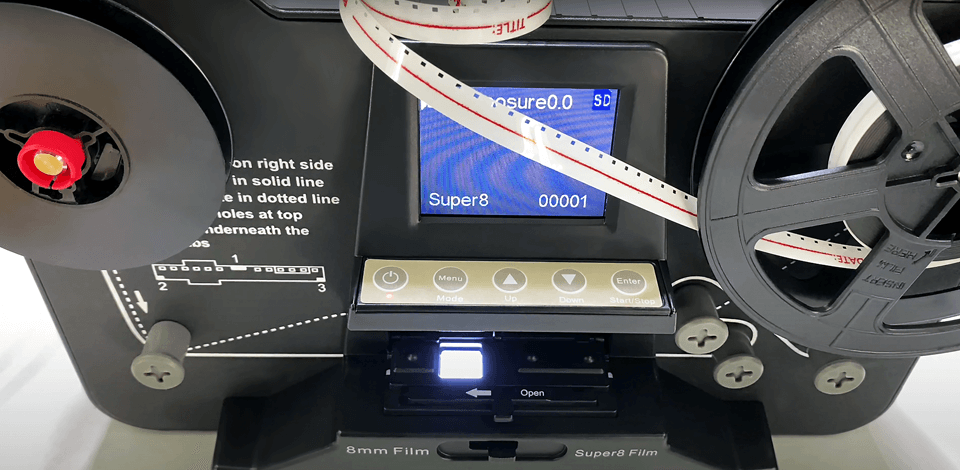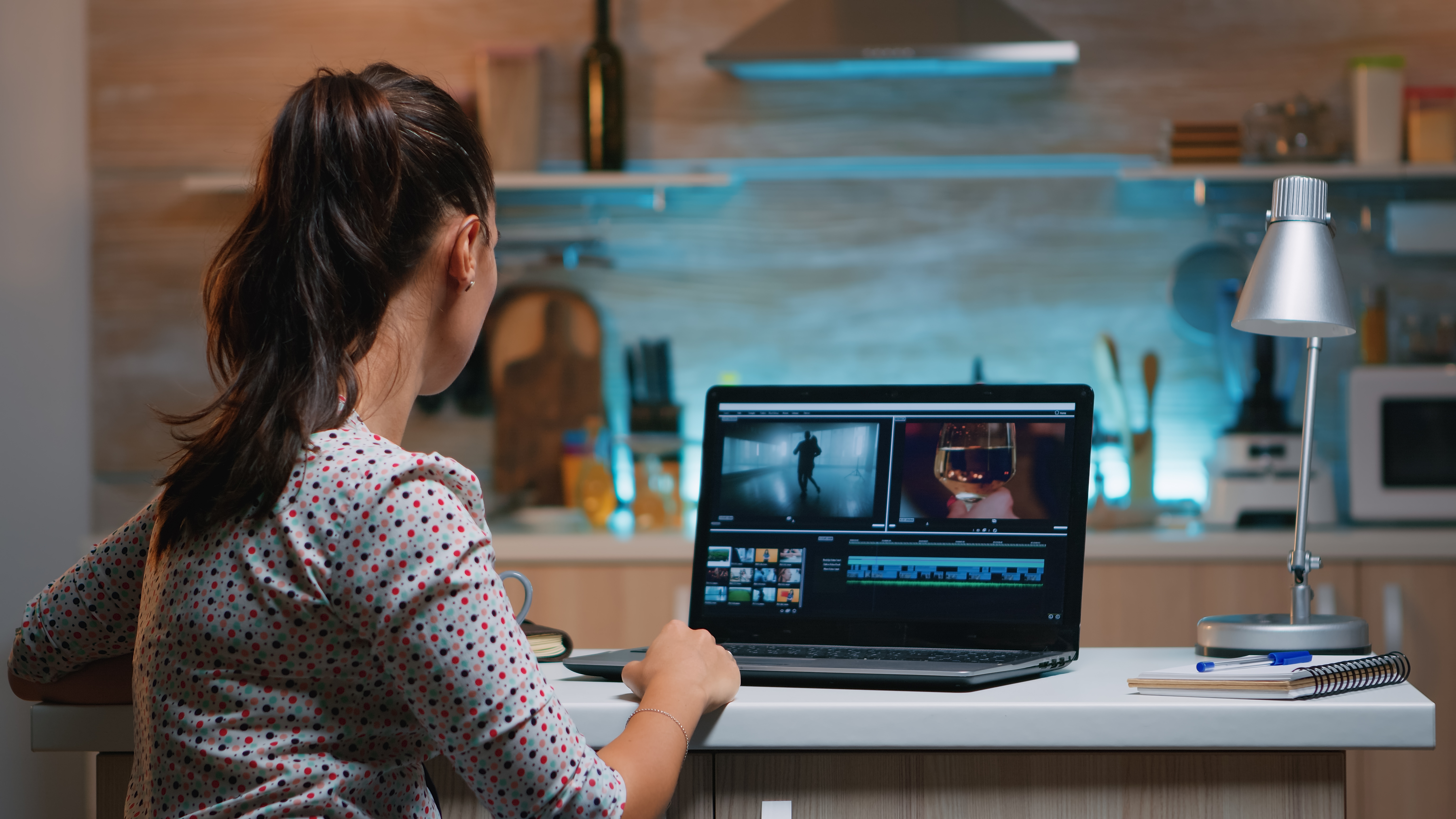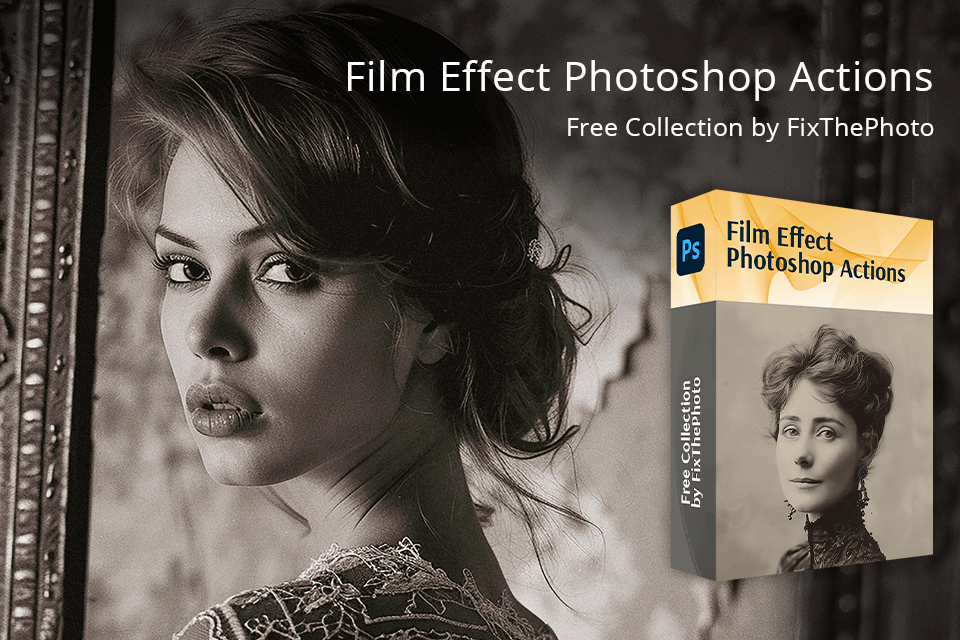
|
Cost |
The cheapest option; requires only a projector and camera.
|
|
Quality
|
Different; depends on setup and lighting.
|
|
Effort
|
High; involves manual setup and recording.
|
|
Equipment Needed
|
Projector, camcorder or DSLR camera, tripod.
|
|
Setup Complexity
|
Moderate; requires careful alignment and lighting control.
|

According to this DIY method, you need to project your 8mm film and use a camcorder or DSLR camera to record it. Probably, this is the most effective way to convert negatives to digital photos for free, but to achieve superior quality you should set up the equipment carefully.
|
Cost |
$300-$400; investment in transfer machine.
|
|
Quality
|
Higher quality than DIY recording.
|
|
Effort
|
Moderate; less tiresome than DIY methods.
|
|
Equipment Needed
|
Transfer machine with the embedded projector and camera.
|
|
Setup Complexity
|
Moderate; correct setup and calibration are crucial
|

A transfer machine allows you to convert 8mm film to digital format in a more professional way. This approach involves integrating a projector and camera into one unit to achieve better quality than DIY methods.
|
Cost |
The highest; depends on length and services.
|
|
Quality
|
Premium; experts use pro-level equipment and restoration techniques.
|
|
Effort
|
Minimal; all work is done by the company.
|
|
Equipment Needed
|
None; the company provides all equipment and handles all processes.
|
|
Setup Complexity
|
None; professionals manage everything.
|

|
Cost |
Varies; the price is usually calculated per foot or roll of film.
|
|
Quality
|
Typically high; depending on the service provider.
|
|
Effort
|
Low; usually you need to mail your film to the service.
|
|
Equipment Needed
|
None; the service provider offers its equipment.
|
|
Setup Complexity
|
None; the service provider offers its equipment.
|

The result you’ll get from using a film-to-digital conversion service is similar to the output you’ll get from a professional company. But this service offers online or mail-in options to enable you to convert film without experiencing local limitations.
|
Cost |
$200-$500; price of the scanner unit.
|
|
Quality
|
Great; depends on scanner resolution and configurations.
|
|
Effort
|
Moderate; requires you to scan each frame or reel.
|
|
Equipment Needed
|
Film scanner, computer, scanning software.
|
|
Setup Complexity
|
Not high; a scanner should be set up and calibrated
|

Film scanners designed for 8mm film provide you with an easy and hassle-free method for converting the film into digital format. Conveniently, they often come with software for direct digital conversion.
|
Cost |
$150-$300; depends on the features included in the kit
|
|
Quality
|
Moderate; may not match the quality offered by professionals
|
|
Effort
|
Moderate; you need to learn kit instructions and use the equipment properly
|
|
Equipment Needed
|
The kit usually includes a projector, camera, and conversion software.
|
|
Setup Complexity
|
Moderate; requires following kit instructions carefully.
|

Home video conversion kits provide all the needed equipment for you to convert 8mm film to digital format. These kits often provide an excellent price-performance ratio.

If you want to refine your photos with sophisticated film effects, try out this free bundle of actions. But first, I recommend you to find out how to install actions in Photoshop, especially if you haven’t done this before.
You should consider your needs and budget to choose the most appropriate method for you. DIY enthusiasts can try recording the footage as it plays or purchase a film scanner, which is available at a moderate cost. If pro-level quality is of paramount importance to you, consider either a transfer machine or professional service. Each method has its pluses and minuses, as well as requires some effort.
The cost mainly depends on the chosen method. DIY methods are the most affordable ones, while a film scanner can cost between $200-$500. As for transfer machines, their price usually ranges from $300 to $400. Of course, professional services are the most expensive. The cost of the project in this case depends on film length and additional services.
To do this, you’ll need to purchase a projector, a camcorder or DSLR camera, and a tripod. Set everything up in a dark room and project the film onto a screen. Ensure proper illumination and align the camera to capture the projection. Make sure that the projector screen is clean to eliminate image distortion. Before recording the whole film, test the setup.
A film-to-digital transfer machine is fitted with a projector and camera to digitize 8mm film professionally. The quality achieved with this method is generally better than the one offered by DIY setups. The machine can both project and record content, making the process of conversion simpler and more efficient.
Good reputation and positive reviews are the two most important criteria for choosing the company for digitizing your film. Discuss your specific needs and ask the company representatives whether they provide such services as sound restoration. Select the digital file format and storage option. Although this method is the most expensive one, it is also the easiest and the most convenient way to do this job.
You only need to send your film photography to a service provider, specify the details, and wait for the result. Analyze different services and find the one with positive reviews and flawless reputation. Check how much time they need to perform this job and select the quality of the digital files. This method is not only convenient but also delivers exceptional results.
Film scanners provide a handy way for converting 8mm film into digital format. It is great that they come with software for direct conversion. They provide top-level quality but can be tiresome as you need to scan each frame or reel separately. Make sure that the scanner is set up in accordance with your film type. Besides, it should be clean to avoid dust and scratches on images.
Home video conversion kits offer a great price-performance ratio and deliver decent results. These kits usually consist of a projector, camera, and conversion software. As their price is lower than the cost of professional services, the quality delivered by the home kits may not match the quality of high-end equipment or professional services. Besides, you should learn the kit’s instructions for the best results.
Some professional companies, including FixThePhoto, can repair and restore any defect on the film. They delete scratches to enhance the overall quality. If you are interested in this service, discuss this option with the company you decided to address. Alternatively, you can use photo restoration software for restoring pics ruined by water or fire.